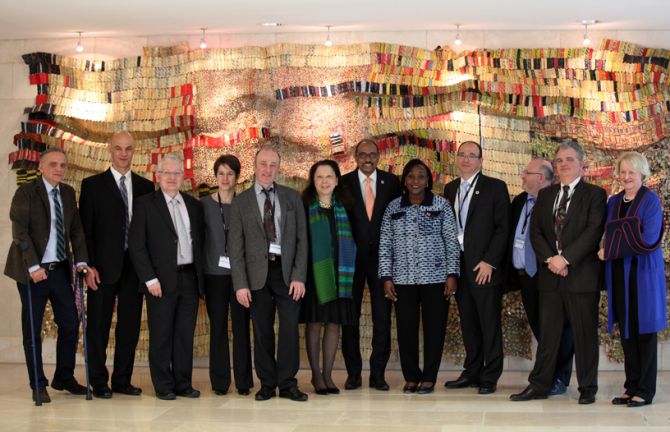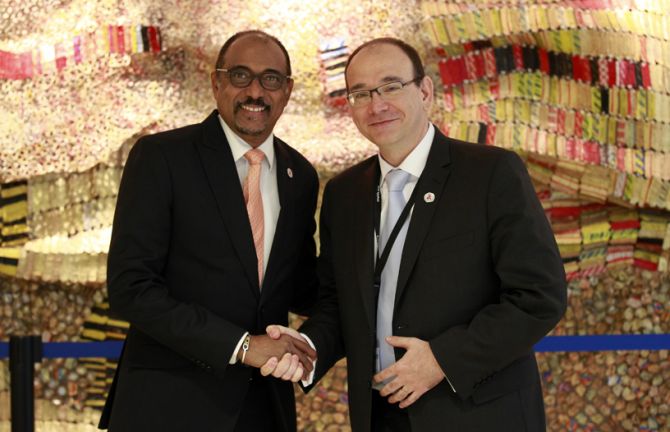



Press Release
UNAIDS to collaborate on new mobile technology platform to improve data collection and advance the response to HIV
08 March 2016 08 March 2016GENEVA, 8 March 2016—UNAIDS and telecommunications operator Orange have signed a memorandum of understanding to collaborate on a new project to strengthen links between health-care providers and people living with and affected by HIV through the use of mobile technology.
Mobile technology will be used to improve HIV services to ensure patient retention in care and treatment adherence and to help break down stigma and discrimination. Data will be collected and analyzed, gaps in services identified and action taken to improve the quality of health care for people living with and affected by HIV. The information collected will be anonymous and full confidentiality will be maintained.
“To achieve UNAIDS’ ambitious Fast-Track Targets by 2020, countries need to innovate,” said Michel Sidibé, Executive Director of UNAIDS. “This partnership with Orange will allow countries to benefit from state-of-the-art technology that is cost-effective and simple to use, to ensure they can provide the highest quality of services for people living with and affected by HIV.”
UNAIDS and partners will use Orange Mobile Training EveryWhere (M-Tew), a web-based platform that has been designed to be fully integrated into health systems and implemented on a large scale. The M-Tew platform will enable health workers to communicate with people enrolled in care through text messages or by phone and voice messages. Health professionals will be able to send messages, conduct text or voice surveys to evaluate user perceptions on quality of services and answer questions through a virtual call centre.
The technology is simple to use and people enrolled in the project will only need a basic mobile phone and a 2G connection to send and receive messages, with no application to download and no Internet connection needed.
A four-month pilot phase will begin at the end of March 2016 in Abidjan, Côte d’Ivoire, which will involve 1000 people living with HIV who are enrolled in HIV treatment programmes. Participants in the pilot study will include people most affected by HIV, including 300 sex workers and men who have sex with men.
“President Alassane Ouattara has called for a reduction in HIV prevalence in Côte d’Ivoire to below 1% by 2020,” said Raymonde Goudou-Coffie, Minister of Health and Public Hygiene, Côte d’Ivoire. “We are committed to achieving this target and the new platform will help us Fast-Track our efforts to ensure we reach this ambitious goal.”
UNAIDS will collaborate on the project with the Ministry of Health and Public Hygiene of Côte d’Ivoire, the Autonomous District of Abidjan, Orange Côte d’Ivoire and civil society partners, including organizations of people living with HIV. After the pilot phase, the project will be rolled out more widely in health facilities across Abidjan, with plans to expand to other priority countries in the region.
The partnership will advance efforts to Fast-Track the response to HIV towards ending the AIDS epidemic as a public health threat by 2030. To do this will require new innovations, front-loading investments over the next five years, reaching the UNAIDS 90–90–90 treatment target, expanding access to HIV prevention services and ensuring zero discrimination.
UNAIDS
The Joint United Nations Programme on HIV/AIDS (UNAIDS) leads and inspires the world to achieve its shared vision of zero new HIV infections, zero discrimination and zero AIDS-related deaths. UNAIDS unites the efforts of 11 UN organizations—UNHCR, UNICEF, WFP, UNDP, UNFPA, UNODC, UN Women, ILO, UNESCO, WHO and the World Bank—and works closely with global and national partners towards ending the AIDS epidemic by 2030 as part of the Sustainable Development Goals. Learn more at unaids.org and connect with us on Facebook, Twitter, Instagram and YouTube.
Press centre
Download the printable version (PDF)
